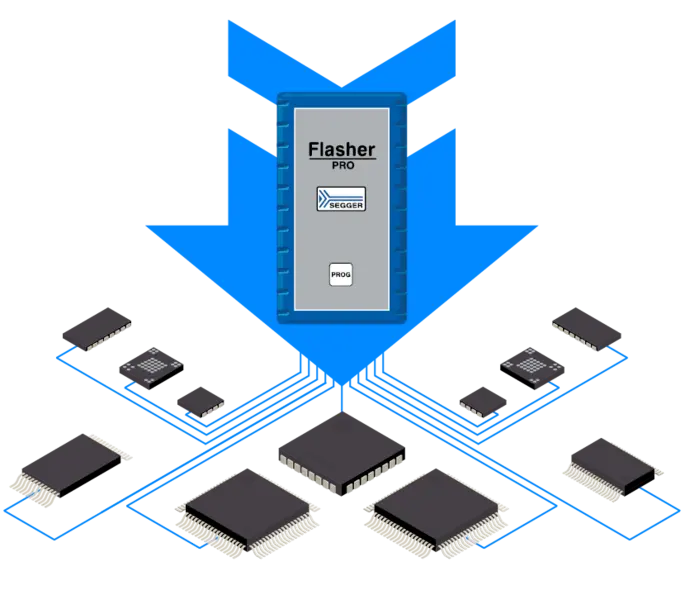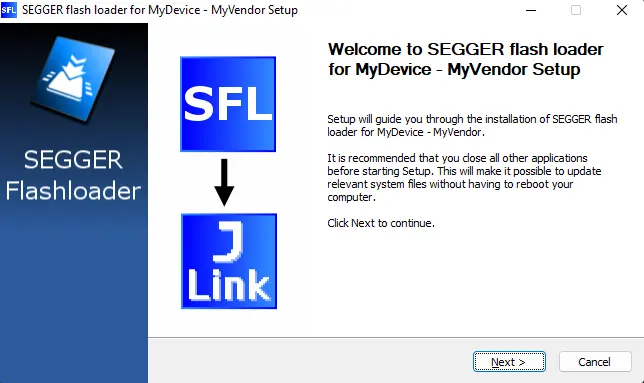Flasher DSK
The Flasher Device Support Kit (DSK) enables silicon vendors and customers to add support for new devices on their own.
Overview
A new memory device – such as the internal flash memory of a microcontroller or external rewritable non-volatile memory – usually requires a flash loader for programming. While SEGGER is continuously updating its Flasher software for new devices, some devices may have not yet been added. To enable customers to fill in the gaps on their own, the Flasher DSK is offered. With the Flasher Device Support Kit, customers can create Flasher Device Packs and an installer to distribute their Flasher Device Packs.
Key features
- Enables high speed programming of devices not yet added to the support database
- Available for cores not yet supported by Flasher
Most flexible programmer
With the Flasher DSK, all customers can ensure that their production setup will work with any target memory they choose. They only need one programmer for all setups. As Flasher programmers can be quickly set up for different tasks, reconfiguring a production line with the Flasher family is a breeze.

Flasher Device Packs
Flasher Device Packs define how to handle target devices while programming. They can include a RAM Code, firmware calls and device-specific initialization.
Writing Flasher Device Packs using the Flasher DSK gives customers access to the Flasher firmware API and device definition attributes. Programming can be set up to use the standard interfaces such as JTAG, SPI, UART and SWD as well as FINE, SWIM, PDI, I²C, ISP, bitbanging and more. The hardware interface is specified so that one pin is for input and seven pins can be used for any I/O operation.
The Flasher DSK includes device definition templates, the API documentation for the Flasher firmware, as well as documentation for device definition and an installer. The J-Link DSK is also included.

Third-party device additions
Silicon vendors or project managers who have device support files for new devices may require a way to distribute the files that include the support. The files can either be copied to the end user's hard drive or added by simply running an installer. The Flasher DSK comes with a template for an installer, that sets this up within Microsoft Windows.
Flasher DSK Package
The Flasher DSK includes everything which is needed to add support for a new device to the Flasher software.
| Name | Description |
|---|---|
| Emdedded Studio license | Embedded Studio may be used free of charge to create or modify Flasher device packs. |
| Emdedded Studio development pack | This Embedded Studio package may be installed to create Flasher DSK projects and develop PCodes and DDFs. The pack also includes the required tools to validate and build custom flash loaders. |
| PCode template | Flasher PCodes are C-like script files which are compiled into object code. These object codes can then be loaded and executed by the Flasher firmware for standard operations like initialisation, erasing, reading, writing, or verifying. |
| Device definition file (DDF) template | Device definition files are XML files required by U-Flash to define support, device properties, and configuration including dialog elements for devices. |
| Tools | Tools for building and validating PCodes and DDFs. |
| Support | Includes 6 months of free support (2h) and updates. |
FAQ
Q: I am using a device with CPU core / architecture XYZ, but I cannot find this core on the list of supported CPU architectures for the SEGGER flash loader. Can I still use the Flasher DSK + SEGGER flash loader?
A: Yes, please use the Flasher DSK. This is what the it was made for!
Q: I have an SPI flash connected to my Cortex-M4-based MCU, but the SPI flash is not memory-mapped into the MCU address space. Can I still use the DSK + SEGGER flash loader?
A: Yes. This task requires the J-Link DSK which is part of the Flasher DSK.
Q: What is the difference between the Flasher DSK and the J-Link DSK?
A: The J-Link DSK is required to add newly supported devices based on cores already supported by J-Link. Such devices are then also supported by the Flasher production programmers. The Flasher DSK extends these options to support new devices to support any core, any interface. Target devices supported by the Flasher DSK include MCUs, SoCs, and memories.